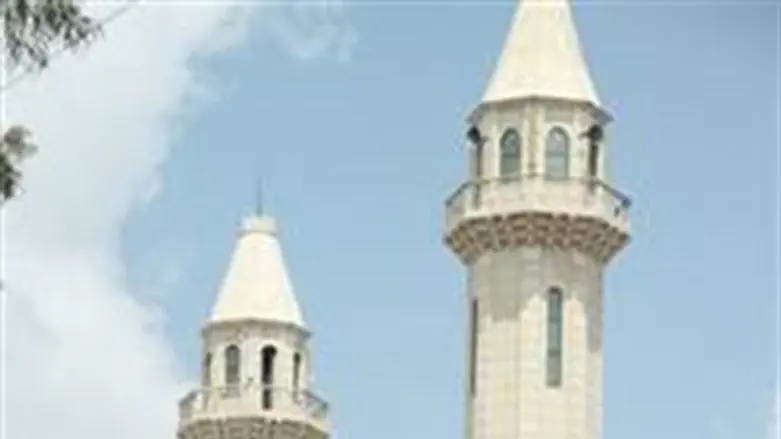
Dozens of residents of the Arab city of Tayibe demonstrated on Saturday to protest the bill that would require mosques to temper the prayer announcements made by muezzins at Islamic prayer times.
According to a report on the website of local newspaper Kul al-Arab, the protesters gathered at the entrance to the city carried banners which read: “Burn the hands of all who burn mosques”, “The sounds of the mosques will remain a pain in your throat,” and “Stop harming the sanctity of mosques,” among others.
The head of the Islamic Movement in Tayibe, Abd al-Hakim Hajyahia, told Kul al-Arab, “The law to prevent the sound of the muezzin in mixed Arab-Jewish cities is an injustice and we will never agree that it be approved. The voice of the muezzin will be heard until the time of salvation.”
He added, “Given that these mosques were built before the people who are angered by the sound of the muezzin came onto the scene, if they cannot stand to hear the voice of the muezzin, they can get out of here.”
“If the law is approved,” he warned, “the Arab and Muslim masses will go out to the streets to resist this law, which is inconsistent with the simple laws relating to human rights, and contrary to the Declaration of Independence that gives freedom of religion.”
The law was proposed by MK Anastasia Michaeli and, while most members of Michaeli's Yisrael Beiteinu party support the law, it is not clear that most of the other factions in the coalition do. Many government officials, including Knesset Speaker Reuven Rivlin, have expressed opposition, fearing the reaction of Arabs to the law.
At issue, for the most part, is the early morning call to prayer, the Fajr, which is called at least a quarter hour before sunrise, when most people are still sleeping. Many Israelis have complained about the call to prayer, which is often broadcast very loudly with the help of speakers and amplifiers, especially in cities with large Arab populations like Jerusalem.
“No one is against freedom of religion,” Michaeli said. “But along with freedom of religion must come environmental awareness, and consideration of others. When families, the elderly, small children, and working people who need their rest are forced to wake up in the early hours of the morning because of the muezzin's call, we are talking about a clear violation of the law. People who live near mosques need not suffer, and coexistence cannot be a reason for damaging the quality of life,” she said.
The government later postponed a discussion on whether or not to support the law. The delay was made at the request of Prime Minister Binyamin Netanyahu.
Ministers Dan Meridor, Michael Eitan, Limor Livnat and Benny Begin are reportedly opposed to the law, which leftists call "the law for muzzling Muezzins," and ministers Gideon Saar and Moshe Cachlon are reportedly also expected to vote against it.
Unnamed sources in Likud were even quoted as saying, "What about the noise that emanates from churches and synagogues? Shouldn't that be taken care of as well?"
